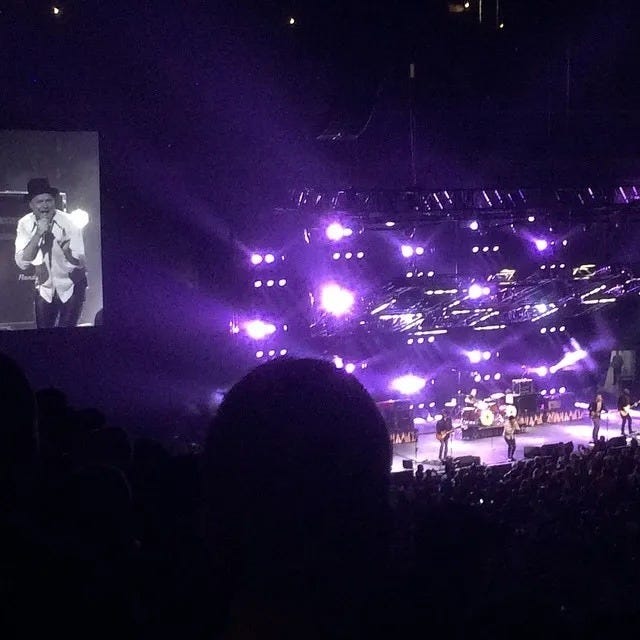Disenfranchised Grief, or When Grief Doesn't Fit Society's Norms (ft. Brian Moritz)
Ever grieved a celebrity? This post is for you.
B.B. King is the musical artist I’ve seen most in concert1. The first time was electric; he was spry, moving around and dancing, the band was tight, and he put on a nearly two-hour feast of blues music.
The last time I saw him was on a soundstage in Big Flats, N.Y. John Hiatt and Buddy Guy opened for him as part of a summertime traveling blues festival. We were close enough to the stage where I could see a clock propped up. Promptly at 10 p.m., he stood up, walked off the stage while his handlers tossed pins into the crowd in lieu of guitar picks. I’m not sure he played an actual song, as much as he noodled on Lucille, and sang bits and pieces of his work.
I just remember that he looked fragile as a 76-year-old that night. Being on the road 300 days a year for 60 years can do that to a body. Diabetes and high blood pressure took care of the rest. A series of small strokes and vascular dementia finished him off in 2015.
I knew I was signing up for a diminished version of what I had seen in the late 1990s for the first time, but that was okay. There’s a certain connection people have with live music. You adopt a band or artist as a favorite or as one you like. You buy their albums and watch their videos, but the connection to them is built through the intimacy of live music.
In July, I stood about 100 feet from Billy Joel when he played the last show of his residency at Madison Square Garden. My wife and I have seen him four or five times, and we decided that we wanted to catch one of the final appearances at The World’s Most Famous Arena2. We were there with 19,000 strangers for what amounted to a three-hour sing-a-long. The seating area shook from the noise and movement of the crowd. We knew the songs we would hear and their arrangements; Christ, he’s been playing most of his songs the same way for 20 years. But, it was worth the exorbitant price that I paid for the seats on the secondary market and not simply because of the moment.
Billy Joel, whom I recognize is not everyone’s cup of tea, is 75 years old. He, like B.B. King before him, isn’t going to be around much longer. He certainly isn’t going to tour until his final days like B.B. King did. So, if that was the last time I saw The Piano Man, I’m good with it. My connection to his live music happened years ago when I first saw him at the Dome in Syracuse, along with 30,000 others. This was a nice send off, if it is indeed the last time I see him play.
When B.B. King died, I turned my Facebook profile photo to a picture of him and probably wore a black shirt to work. We had no personal relationship, but I was connected to his music and his art was something I revered and respected. My symbolic show is all I can muster for famous people when they die. It’s selfish of me, but I want to appreciate their talent and their art more than the mortal forces at the controls of these things.
Disenfranchised grief the umbrella term for these feelings; the grief of things that aren’t socially recognized or fit in with society’s definition of loss. Think about the days of Covid-19 isolation. There were endless social media posts from parents about their child missing out on graduation ceremonies. This is disenfranchised grief; a loss of an experience that would have been meaningful3 that others don’t understand or don’t fit the traditional mold.
This meaningfulness doesn’t end at the experience but at the perceived relationship one has with someone. There’s a scene in the film Mr. Holland’s Opus, where Richard Dreyfus and his wife, played by the always brilliant Glenne Headly, experience the emotional torrent — anger, sadness, betrayal — of John Lennon’s murder and death4. Lennon’s death was sudden and tragic5, but it reverberated globally for a few reasons. The Beatles were…The Beatles. More than just a music group, they wrote a soundtrack to the lives of the Baby Boom generation and suddenly a piece of that was gone. This was a piece of their youth ripped from their grasp. There would never be a reunion. There COULD never be a reunion. Who wanted to see Ringo, Paul and George on stage? It only mattered if the foursome came back together, and that possibility ended.
And who could these people turn to but each other? My grandparents would have scoffed at my parents grieving the passage of John Lennon, just as my father would have given me a raised eyebrow after the death of 2Pac or Notorious B.I.G. Thus the disenfranchisement.
So, how do you manage disenfranchised grief? It’s sort of on your terms. Primarily, you need to recognize that your feelings are valid. It might help to have some validate them for you; my wife understood that the death of B.B. King represented a loss to me. She also knows that I’m not going to break down into a sobbing mess when a celebrity dies. I spent a few days listening to his music nonstop.
And, like other forms of grief, you need to find a channel for your feelings to commemorate their life, work and passing. Maybe it’s making plans to visit where they are buried. How many people go to the Eternal Flame at Arlington National Cemetery each year to pay their respects to President John F. Kennedy? I’m sure plenty of people alive that day in 1963 have visited to pay their respects and honor the feelings that are still very fresh.
Maybe it’s spending the anniversary of the event reminding yourself what it meant. Every year on September 11, I listen to some of the media coverage of the day. It’s part of my way of commemorating the moment and dealing with the cacophony of feelings that still exist.
Or, maybe you write an essay about the grief you feel over your favorite band, like
of recently did.Grieving Gord Downie
By Brian Moritz
The people sang in the streets of Toronto.
They came from across the city and presumably across Canada. They gathered at the Toronto International Film Festival to celebrate the premiere of a four-part Amazon series called No Dress Rehearsal.
They came to Toronto and they sang. The four surviving members of The Tragically Hip joined the crowd, singing several of the band’s biggest songs:
“With illusions of someday/casting a golden light/no dress rehearsal/this is our life.”
That’s from the song Ahead By a Century, which was the last song the band played at their last concert on their last tour in 2016, a little more than a year before frontman Gord Downie died of brain cancer.
Other writers have written eloquently about what Gord and The Hip meant to Canada. I can write about what he meant to me.
I remember where I was when I found out Gord died — on my way to work at Oswego on Route 350 near Gananda. I remember where I was when I watched that last show — in my living room in Fairport, watching on the CBC music app, tearing up at least three times.
I met him exactly once, and it was at a radio-station organized meet-n-greet at St. Bonaventure University, where they played our senior year. I knew him only through his music, his lyrics, his voice on my stereo. So, it was grief at a distance. But it was grief nonetheless. He was the lead singer to the soundtrack of my life, and he was gone.
It’s a weird kind of grief, isn’t it?
Maybe you’re a little older than me and you felt similarly when Kurt Cobain died by suicide, or when Biggie or 2Pac or Selena were murdered. Maybe you're a little older still, and you remember the night John Lennon was shot, or even back further to The Day The Music Died.
These are all textbook examples of parasocial relationships. Cynthia Hoffer and Bradley Bond define them as “socio-emotional connections with media figures.” I’ll leave the details to psychologists and scholars in that field, but for our purposes here, they are real and they are common. Yes, it’s easy to think about Swifties here. But if you’ve ever once referred to a sports team you’re fan of as “we,” you’re in a parasocial relationship.
And while they can clearly go bad in any number of ways, parasocial relationships aren’t automatically bad. They’re a normal part of a life where you consume media and culture.
But there’s a powerful moment in a movie I remember seeing at the Rock & Roll Hall of Fame that’s stayed with me for decades. Pete Townshend was talking about the losses of Jimi Hendrix, Janis Joplin, Jim Morrison and others.
“My friends are dead. My friends! They may be your fucking icons, but they were my fucking friends and they’re dead!”
That’s the thing, isn’t it? Gord Downie was the lead singer of my favorite band. But he was a husband, a dad, and a friend. The other four members of The Hip just didn’t lose the band’s lead singer; they lost their friend of nearly 40 years. The sadness I felt at Gord’s death was nothing compared to what they felt watching him endure brain cancer or the loss they felt.
It was also nothing like the grief I felt when my mom died, or when we had to put our family dog down.
But it was still grief. I can acknowledge there was grief while still placing it in a proper context.
I got to see The Hip on that final tour. It was Memorial Day, and I ducked away from our village’s annual parade and into a now-closed coffee shop. I used up every ticket buying miracle of my life and snagged two upper-level tickets for their show later that summer in Hamilton, Ontario.
It had been a weird few years in my own fandom. The band’s later albums didn’t connect with me the way they had when I was in my 20s. In the excellent book The Never-Ending Present, Michael Barclay describes that it was a challenging time for the band as well. I can remember leaving a show in Buffalo in 2014, where they had played one of their classic albums front-to-back, in a daze, honestly feeling like the show had left me cold.
In hindsight, I was grieving. Grieving the perceived loss of my favorite band, of something that had been such a key part of my identity and my life.
Then came the announcement. The ticket miracle during the Memorial Day parade. My sister and I went to the show at what I’ll always call Copps Coliseum in Hamilton in August 2016. It was never formally called a farewell tour, but we all knew what it was.
There was a moment, toward the end of the song “Grace, Too,” where Downie screamed into the mic and appeared to break down on stage. All of us in the crowd, all 19,000 us, cheered louder than we had all night. It felt like we were holding him up.
We were saying goodbye.
There’s something special in knowing something is the last time. You savor it. Treasure it.
I hope all of you get the chance to say goodbye to your favorite band.
But it’s not really goodbye, is it? That’s the thing about grieving a parasocial relationship. It’s real, but also at a distance. Four years later, I can still feel the hole the loss of my mom left. I swear we are still vacuuming up fur that Zoey left in our house five years ago.
Gord Downie? Here’s where he’s always lived — in my headphones. He’s gone, but he’s not. The Hip has been re-releasing classic albums with unreleased songs and live cuts. There’s a show coming out on Amazon.
The people sang in the streets of Toronto, remembering his singular voice and how, even though we never met him, we’re all richer for having seen him.
Don McLean was wrong.
The music didn’t die that day.
In fact, it’s the only thing that’s always there.
First thing we’d climb a tree, and maybe then we’d talk …
Final Thoughts on Finality
Dirt Nap is the Substack newsletter about death, grief and dying that is written and edited by Jared Paventi. It’s published every Friday morning. Dirt Nap is free and we simply ask that you subscribe and/or share with others.
We are always looking for contributors and story ideas. Drop a line at jaredpaventi@substack.com.
I’m all over social media if you want to chat. Find me on Facebook, Twitter/X, and LinkedIn. I’m on Threads and Instagram at @jaredpaventi.
If you or someone you know is in crisis, call or text 988 to reach the Suicide and Crisis Lifeline or chat live at 988lifeline.org. For additional mental health resources, visit our list.
Six times, by my count.
If you’ve never attended a concert at MSG, I recommend it highly. It’s an experience, regardless of the act.
If I had a nickel for every parent group on Facebook full of bitching that there wouldn’t be a moving-up ceremony for a kindergartener in 2020, I could buy us drinks.
I wish I could find a clip of this…
As is all death, as we have learned.











So glad I got to see Gord and The Hip on their Fully Completely tour. He was a tough loss but we had the chance to grieve with him in a joyful way.